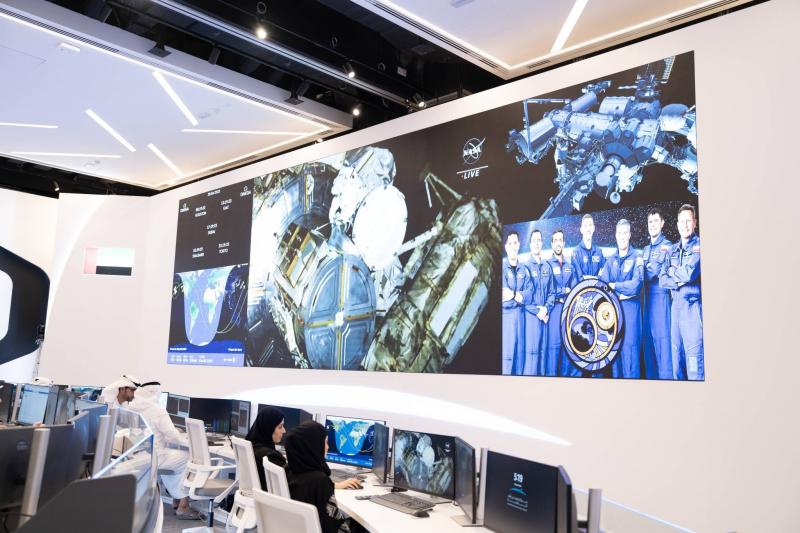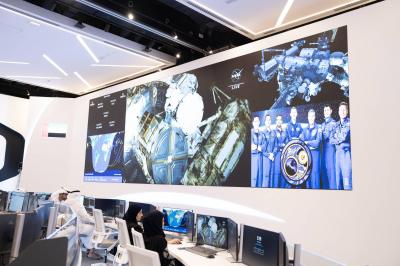Salm al-Marri, the Director General of the Mohammed bin Rashid Space Centre, confirmed that the UAE's Astronaut Program is sustainable and aims to develop a national team of astronauts to achieve the country's aspirations in scientific explorations, participate in manned exploration missions, and contribute to global space exploration missions by developing and training a team of Emirati astronauts. He stated that astronaut Sultan Al-Neyadi, who is undertaking the longest space mission in Arab history lasting 6 months aboard the International Space Station, has elevated the status of his country and all Arabs, exceeding all expectations. He added that upon Sultan's return to Earth, they will review strategic plans to secure a seat on one of the space flights every 3 to 5 years in the upcoming period.
He highlighted the numerous achievements Al-Neyadi accomplished during his mission, including a historic Arab achievement as the first Arab astronaut to conduct a spacewalk outside the International Space Station, as part of mission 69 onboard the station. He noted that this achievement allowed the UAE’s flag to touch space, placing Al-Neyadi among the tenth globally for spacewalk missions outside the International Space Station, which are "not bought" but rather a result of the country's capabilities and its relations with nations worldwide.
Regarding the ambition of the UAE for space exploration, Al-Marri mentioned that the country now has 4 qualified astronauts and seeks to continue its ambitions through the UAE Astronaut Program, completing the training of astronauts Noor Al-Matrooshi and Muhammad Al-Mulla at NASA's Johnson Space Center in Houston to prepare them for upcoming space missions like their counterparts Hazzaa AlMansoori and Sultan Al-Neyadi. He added that preparations are underway to conduct scientific experiments and exploratory research missions with the help of universities and national expertise, along with the ongoing assessment of astronauts and their readiness for future missions.
He clarified that each space mission requires various specific conditions and preparations determined by the type of mission, the nature of the flight, and the astronaut's bodily condition, among other necessary conditions after completing tests. Concerning Arab partnerships in the field of space, Al-Marri affirmed that the UAE has several partnerships with Arab nations such as Bahrain and Kuwait, and discussions with Egypt and Saudi Arabia regarding training in satellite construction, in addition to continuing collaboration between the UAE and Bahrain following the launch of the "Daw” satellite, and preparing for participation in future lunar exploration missions through the new Rashid 2 explorer project, along with entering partnerships with Kuwait through various training programs, as well as visits coordinated with other Arab countries.
**We are Preparing to Launch the Largest Satellite "Mohammed bin Zayed Sat" MBZ-SAT Mid-2024**
On the subject of prominent new projects that the Mohammed bin Rashid Space Centre will undertake, he mentioned that the centre is preparing to welcome Sultan Al-Neyadi back in a few weeks after his external mission to begin therapeutic, scientific, and experimental programs where he will share his experience with the community through initiatives with students in schools and universities, whether in the UAE or Arab countries. He also stated that the centre is completing the construction of the "Mohammed bin Zayed Sat" MBZ-SAT satellite, expected to be launched in mid-2024, which will be the largest satellite in the centre's history and the most advanced in the region in terms of high-resolution satellite imagery.
Al-Marri confirmed that the new satellite is designed and manufactured by the Mohammed bin Rashid Space Centre, in addition to contributions from the Emirati private sector, whether in raw materials from aluminum and cables or other materials used, all sourced from Emirati companies. He noted that the "Mohammed bin Zayed Sat" satellite features advanced modern technologies for capturing images and will contribute to sustainable urban planning, monitoring environmental changes, predicting natural weather phenomena, monitoring water quality, and agricultural development.




